The good folks at DataXu, in collaboration with market research firm MORAR and Withpr, have produced a fantastic quantative research study on the current state of marketing technology management: Modernizing the Mix: Transforming Marketing Through Technology and Analytics. You absolutely have to download this report — it’s a gold mine of insight into the current state of martech and adtech.
They surveyed 532 marketers, in both the US (174) and Europe (358), across a wide range of organizational sizes and marketing budgets, to produce one of the most authoritative and statistically significant studies of how firms are managing marketing technology today.
Here are 3 key statistics that popped out at me from their report:
#1. Technology is recognized as a fundamental part of marketing.
Marketing is now widely acknowledged as a technology-powered discipline. 78% of U.S. marketers and 63% of European marketers say that understanding marketing technology is a critical skill for senior marketers to be successful.
In fact, in this study, understanding marketing technology was ranked only behind creativity — and ahead of understanding digital media, managing people, and being data literate — as an increasingly important skill for successful senior marketers.
I have to emphasize this qualifier in their survey question: important for successful senior marketers. This represents a tremendous shift in marketing culture from even just a few years ago, when dealing with this “techy stuff” was considered beneath most marketing executives.
It’s also great to see marketing technology being kept in perspective with the rest of the discipline. Marketing technology by itself isn’t the singular secret to marketing success. Creativity matters more — how you apply that technology in the service of brilliant and compelling campaigns, programs, and customer touchpoints. Effectively managing more diverse and tech-empowered teams, with data-savvy leadership, is essential too.
But marketing technology is now right there at the leadership table.
This widespread acceptance of technology as a fundamental part of marketing has resulted in several powerful ripple effects, including the following…
#2. Marketing technologists are an integral part of the marketing team.
70% of marketers now report that they have at least one person on the marketing team who is mainly responsible for marketing technology — i.e., a marketing technologist. An additional 15% state that they are looking to recruit someone for such a role within the next 12 months.
In the punctuated equilibrium of rapid marketing evolution — an analogy identified by my good friend Gord Hotchkiss, who gave a terrific talk on other parallels between science and marketing at the last MarTech conference — where so many new, experimental “species” of marketers have appeared, it’s remarkable when any one achieves critical mass as a recognized profession.
Marketing technologists, in all their splendid varieties, have acheived that breakthrough.
DataXu’s report also reveals the growing popularity of a particular breed of an executive marketing technologist, the role of a chief marketing technologist (CMT).
Of the companies who participated in this study, 66% currently have a chief marketing technologist in place.
In Europe, the role is even more popular: 73% already have a CMT.
And the report notes that these marketing technology leadership roles are likely to become more prevalent over the next year: of the companies that don’t yet have a CMT role, 26% in the US and 24% in Europe plan to add one within the next 12 months.
It’s terrific to have this data, especially across such a wide swath of companies. The last detailed information I had on CMT adoption was from 2014, when Gartner reported that 81% of big firms (more than $500 million in revenue) had a CMT.
For a little history on these roles, we can dig back into the archives of Who is a chief marketing technologist? (2008) and Rise of the marketing technologist (2010). The role was validated a feature article in Harvard Business Review in 2014.
In a mere eight years, the notion of a “chief marketing technologist” has gone from a radical concept described on an obscure blog to a recognized executive position that has been widely adopted around the world.
That’s pretty wild when you think about it — and it characterizes the incredible transformation that marketing has undergone in this decade.
#3. Marketing is responsible for marketing technology purchases.
I’ve often quipped that the question of who should be responsible for marketing technology is like asking who’s buried in Grant’s tomb — the answer is plainly in the question itself. If it’s marketing technology, marketing should own it. (And, yes, Grant is buried — well, technically entombed — in Grant’s tomb.)
That’s not to say that there aren’t other stakeholders, advisors, and governance controls from IT, procurement, finance, etc., who should also be involved. But when it comes to the marketing department investing marketing budget to achieve marketing outcomes… well, you get the idea: marketing technology is an inherent part of marketing. (See item #1 above.)
But as logical as that seems in today’s world, it’s a radically different organizational struture for technology management than in the past — where anything with the word “technology” was fully owned and operated by the IT department. Such organizational, professional, and cultural inertia takes time to change.
But according to the data from this new study, change has come.
In response to the question of “who is responsible for marketing technology purchases at your company,” participants answered:
- 65% marketing roles — usually an executive such as the CMO, the CMT, or VP marketing
- 16% digital roles — such as a chief digital officer, head of digital, or digital director, who in some companies report under marketing as well
- 18% IT roles — the CIO, CTO, head of IT, or an IT director (who in some cases may actually be a marketing technology specialist matrixed to marketing as well)
These three phenomenon — (1) understanding of marketing technology as a necessary skill for senior marketers, (2) the widespread establishment of the marketing technologist profession within marketing, including executive-level chief marketing technologists, and (3) marketing having responsibility for marketing technology purchases — are clearly all entangled and mutually reinforcing.
Together, they paint an impressive picture of just how mainstream martech and marketing technologists have become.
And these are only a few of the fascinating revelations from this study. Again, I recommend that you download the full report from DataXu.
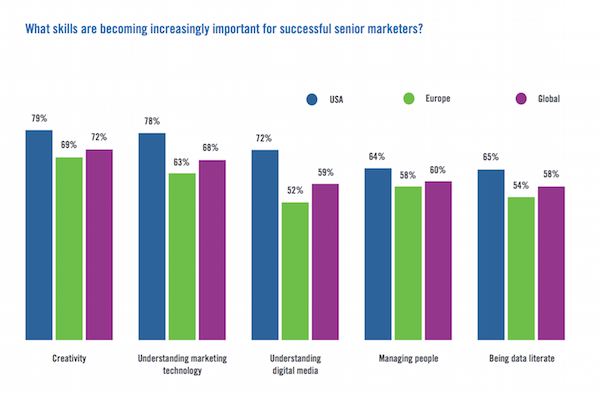
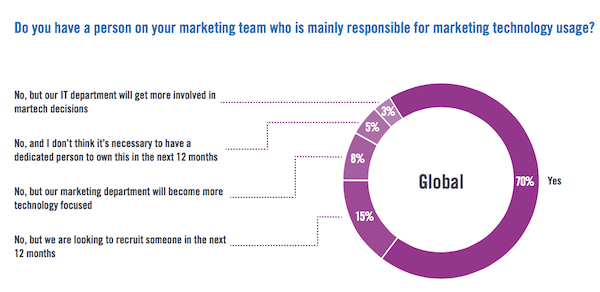
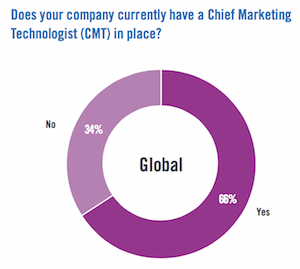
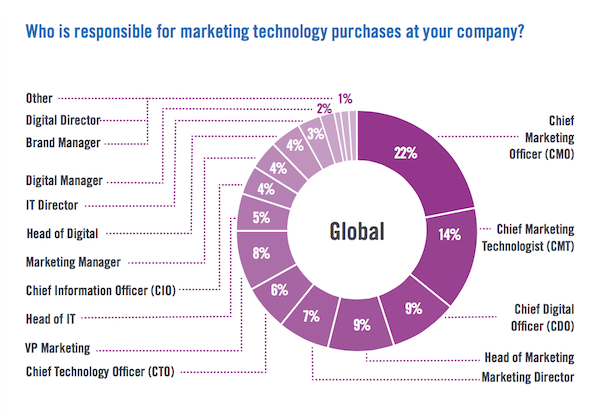


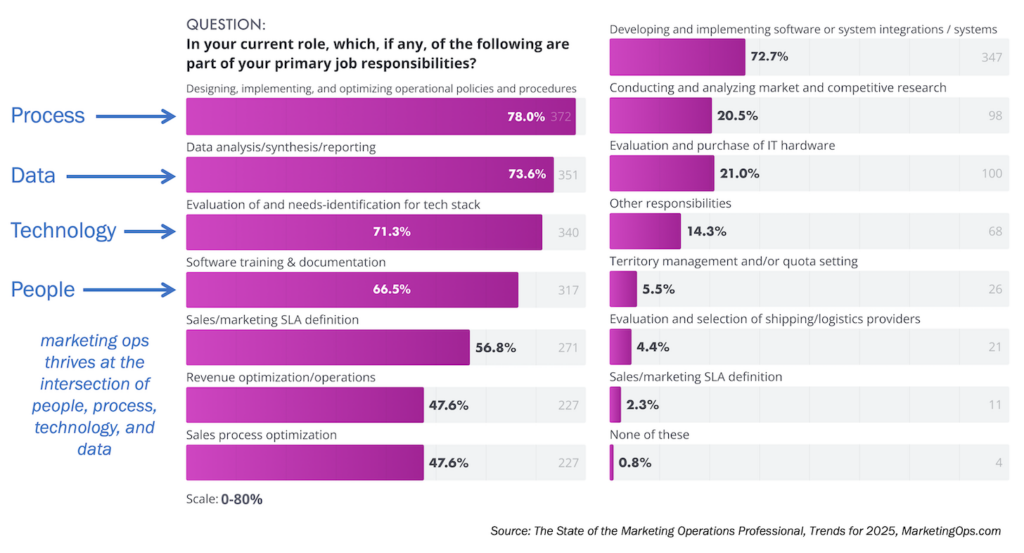
Marketing technology now and then has being changed a lot, marketing used to done through a physical thing that is through advertising via television, radios, now a days it has all being changed, and has become digitalized. Digital marketing is now running with the use of social media platforms and though are productive. Marketing cannot be done alone, it is done with the help of various marketing tools and sharp mind! There are various tools for this purpose, find them at http://betapage.co/
There is another reason the art of Marketing and the science of Technology have converged to create this very real and critical skill set, role & emerging discipline. These people are the glue.
They have an appreciation for both sides of the equation – the art & science needed.
They have experience and an appreciation for the value of data (grown up to be called big data), predictive insights (grown up to be called machine learning), and digital transformation technologies that can action it for better sales & marketing outcomes, yet equally they fully understand marketing, how to get the attention of an audience, the value that creative plays in getting and keeping someone’s attention, and the value of customer centric process and methods so that engagements are relevant.
Many of these execs that have risen through the ranks and spent years using whatever data & technology were available at the time to work toward this goal. They did so when we called it “Database Marketing” in the 90’s and back in that day were pioneering the transformation of mass marketing toward the nirvana of true 1:1 marketing. Its good to see these folks getting a seat at that table, because they will help their organizations survive and thrive in the new world. – Vince (follow me on twitter @vjeffs)